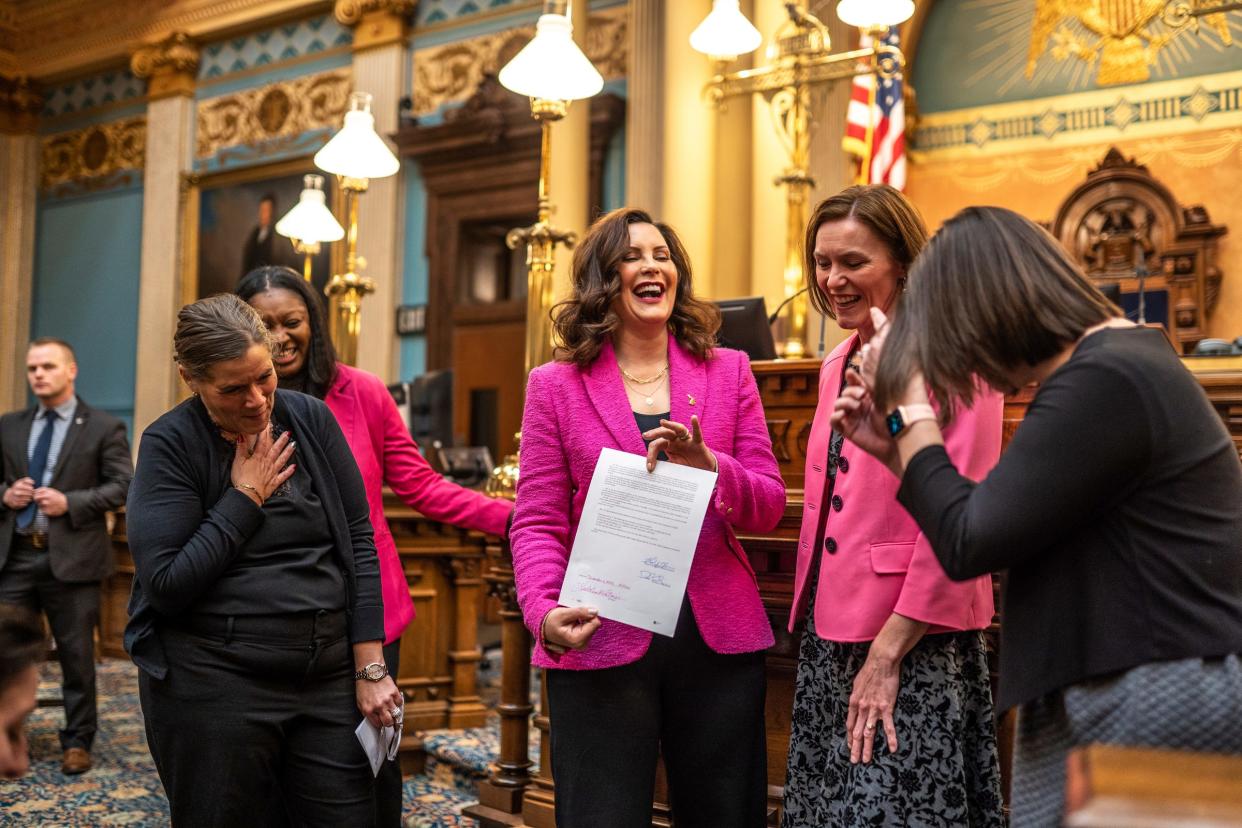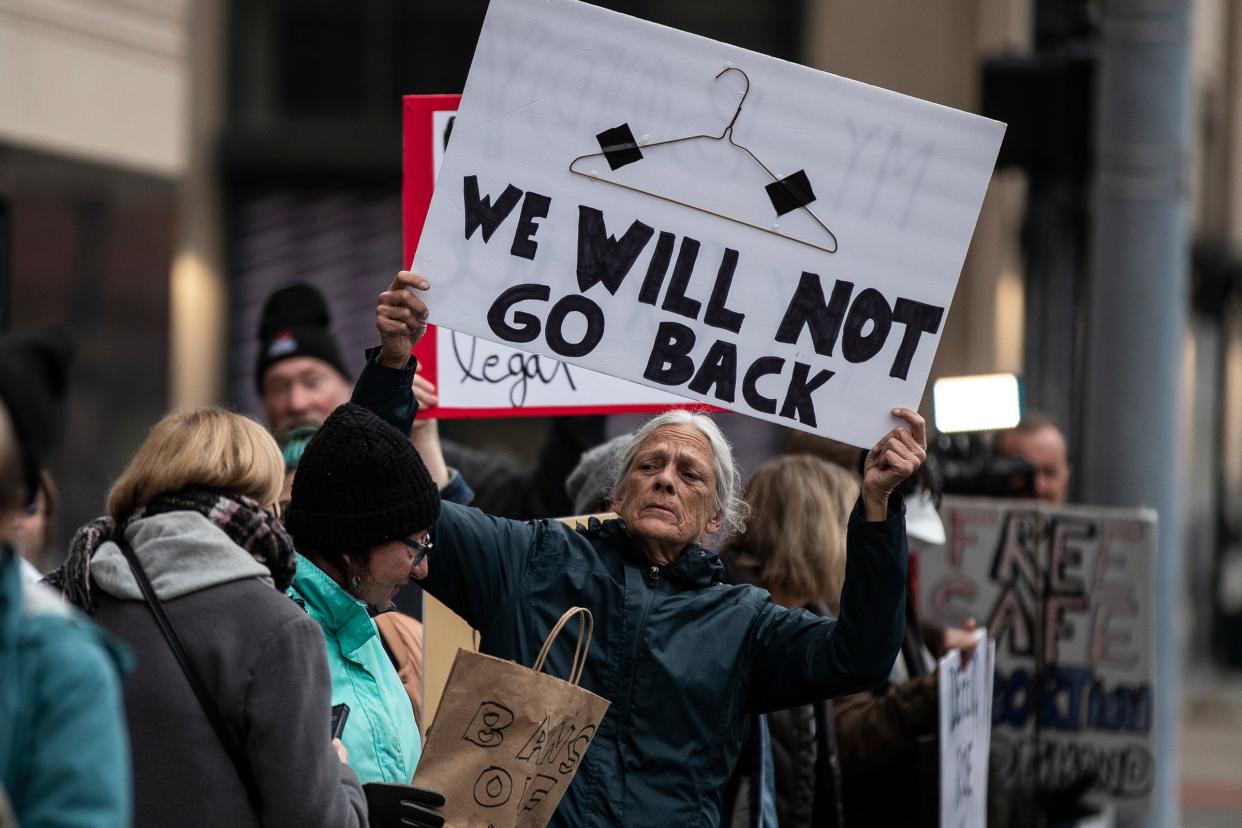Michigan faces new abortion rights fight: Advocates rally against parental consent law
Abortion rights proponents say Michigan lawmakers have more work to do to remove barriers to abortion care. In a new report, advocates deliver an urgent call for lawmakers to repeal Michigan's parental consent law for minors seeking abortions, setting up the next fight over abortion access in the state after voters approved a measure to protect reproductive rights.
While efforts to repeal some abortion restrictions quickly secured a spot on Democrats' legislative agenda, Michigan's parental consent law received little attention in Lansing in the wake of the successful abortion rights ballot proposal.
Under the law, those under 18 years old must obtain the consent of a parent or legal guardian for an abortion. If they can't or choose not to, minors can go through the legal system to petition a court to waive the requirement.
"I think for so long, the judicial bypass process has been propped up as this really reasonable alternative to forced parental consent," said Kylee Sunderlin, legal services director at If/When/How, an organization of lawyers and advocates dedicated to protecting reproductive rights.
But Michigan's law causes serious harm to minors looking to terminate unwanted pregnancies, according to a new report from the American Civil Liberties Union of Michigan (ACLU of Michigan), Human Rights Watch and the Michigan Organization of Adolescent Sexual Health (MOASH).
Most minors obtain the consent of a parent or legal guardian for an abortion, according to state health department and court data analyzed in the report.

"This law is actually of no benefit to the vast majority of young people who do involve their parent in the decision. And for the small number who can't, it can be deeply, deeply harmful," said Jo Becker, advocacy director for the children's rights division at Human Rights Watch.
Minors may fear a parent will force them to continue an unwanted pregnancy or retaliate with physical or emotional abuse, Becker said. For minors who secure a court waiver from the parental consent requirement, the report describes the legal process as onerous and court proceedings as "invasive, distressing, traumatizing, and often arbitrary."
Meanwhile, for those who can and choose to obtain the consent of a parent or legal guardian, the report argues Michigan law should allow pregnant minors to make their own healthcare decisions without parental involvement.
Dr. Sarah Wallett – chief medical operating officer for Planned Parenthood of Michigan – recounts in the report a young patient seeking an abortion who already had an 18-month-old baby. "She didn't have to bring her mom to give birth to the baby she had, or make decisions for her child, but she needed her mom to [consent] to get an abortion," Wallett said in the report. The story underscores "the absurdity of parental involvement," she added.

The latest report on the law from abortion rights proponents reignites a fight that began more than 30 years ago.
A look at Michigan's parental consent law for minors seeking abortions
In 1990, Gov. Jim Blanchard vetoed legislation mandating parental involvement or a court waiver for minors seeking abortions.
The next month, the anti-abortion group Right to Life of Michigan began circulating a petition to re-introduce an identical proposal through a process that allows lawmakers to enact voter-initiated legislation without the governor's approval.
Lawmakers approved the group's "Parental Rights Restoration Act" that year with support from some Democrats and opposition from some Republicans.
A legal challenge to the new law brought by Planned Parenthood and the ACLU temporarily suspended its enforcement until lawmakers made changes that cleared the way for enforcing the law.
Michigan's current parental consent law went into effect in 1993.
Democratic lawmakers have tried to repeal it, introducing legislation when they served in the minority to create a "Reproductive Health Act" to strike the law along with other abortion restrictions.

After the U.S. Supreme Court overturned Roe v. Wade, returning the issue of abortion rights back to the states, Michigan voters passed Proposal 3 in 2022 to enshrine a right to reproductive freedom. With abortion on the ballot, Democrats also won majorities in the state Legislature for the first time in 40 years.
On the heels of the abortion rights victory, Democrats again introduced legislation to create a "Reproductive Health Act" to expand abortion access. But this time, they didn't propose repealing Michigan's parental consent law. Gov. Gretchen Whitmer signed the "Reproductive Health Act" into law last year.
Nine states plus Washington, D.C. have no law requiring parental involvement in a minor's abortion, according to Planned Parenthood. Court orders elsewhere have permanently enjoined parental involvement laws in five other states, according to the Guttmacher Institute, a policy organization focused on reproductive rights.
The ACLU of Michigan has attempted for years to repeal the Michigan law and tried again this legislative session, said Merissa Kovach, the organization's political director. But she said it quickly became clear lawmakers needed further education on the issue and she hopes the new report provides it to them.
Why abortion rights advocates want to repeal Michigan's parental consent law
For minors who cannot obtain the consent of a parent or legal guardian for an abortion or choose not to, they must petition for a waiver in probate court. Michigan's law requires probate court judges to grant a waiver if they find a minor "is sufficiently mature and well-enough informed to make the decision regarding abortion independently of her parents or legal guardian" or a waiver "would be in the best interests of the minor."
The report points out that the law does not define what it means for a minor to be "sufficiently mature and well-enough informed," creating an opening for rulings by judges the report says "can be very subjective."
Going through the judicial waiver process can also delay an abortion sometimes causing a minor to miss the window for a medication abortion, forcing them to undergo a surgical abortion, according to the report.

Overall, the process can prove difficult for minors to navigate from tracking down information online and sifting through legal jargon, said Taryn Gal, executive director at the Michigan Organization on Adolescent Sexual Health. "It is not a youth-friendly, accessible process," she said.
Becker said minors need to first find out about the process for obtaining a court waiver, connect with an attorney, and arrange time off school to appear in court. Once there, a judge – a stranger to them – asks personal questions in a hearing that can intimidate minors.
For those who do obtain the consent of a parent or legal guardian for an abortion, the report highlights how consent does not necessarily translate into support for the minor. The report includes stories from abortion providers recounting parents who yelled at their child, left the clinic to refuse their child a ride home and asked the provider to deny pain medication to their child before the procedure.
Contact Clara Hendrickson at chendrickson@freepress.com or 313-296-5743. Follow her on X, previously called Twitter, @clarajanehen.
Looking for more on Michigan’s elections this year? Check out our voter guide, subscribe to our elections newsletter and always feel free to share your thoughts in a letter to the editor.
This article originally appeared on Detroit Free Press: Michigan abortion rights advocates want parental consent law repealed
